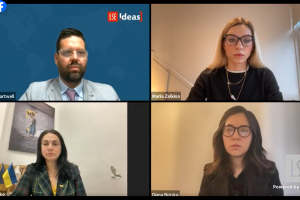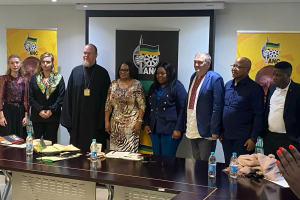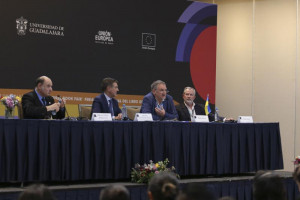The law on reintegrating the Donbas: risks and caveats – experts

The law on the reintegration of Donbas (bill № 7163), which the Verkhovna Rada will consider in the second (and final) reading on Jan. 16, has many inconsistencies. Thus, it requires public discussion with the involvement of the general public and mass media. Experts emphasized this during the discussion titled, “The Law on Reintegrating the Donbas is on the Agenda: Public and Expert Opinions.”

The director of the Ilko Kucheriv Democratic Initiatives Foundation, Iryna Bekeshkina, first presented fresh survey data, noting that public opinion has remained remarkably stable with regard to certain questions for several years. “For example, only 18% of Ukrainians today, as in the previous year, are inclined to believe that peace in the Donbas can only be established by force. Yet the absolute majority of Ukrainian citizens are convinced that peace must be established via compromises. Upon that, 49% believe that compromises can be made to achieve peace, but not all,” observed Iryna Bekeshkina.
The sociologist said that when respondents were shown a list of compromises that are included in the Minsk agreement, they disapproved of many of them. Particularly unacceptable is the proposal to hold local elections in the Donbas based on the terms demanded by militants (63% of those polled are against such conditions and 12% are for them); full amnesty for all combatants who fought Ukrainian forces (58% for, 17% against). People also are against forming local police forces, courts and prosecutorial offices in the Certain Areas of the Donetsk and Luhansk regions (CADLR) exclusively among local representatives (55% against, 17% for). Iryna Bekeshkina stressed that Ukrainian citizens reject the idea for temporarily non-controlled territories to have special political and economic relations with Russia (49% against, 20% for). Mostly unacceptable are such variations of agreements as, making Constitutional changes to upgrade the Russian language’s status to a state language; enshrining in the Constitution “special status” for certain areas of the CADLR, as well as the adoption of a law on the neutral and non-aligned status of Ukraine.
“There is more or less agreement, and what divides Ukraine, is the passing of a law on the neutral and non-aligned status of the country. We know, along with other surveys, that the east, south and Donbas prefer a neutral status for Ukraine. They believe this will somehow promote peace and improve relations with Russia, and so forth,” stressed the researcher.
In this survey, sociologists inserted a new question for respondents in order to learn which international initiatives and Ukrainian government decisions, in their opinion, could promote the process of resolving the conflict in the Donbas. Among them, bolstering EU and U.S. sanctions against Russia received the most votes. Others include building up the armed forces of Ukraine and the conduct of special operations that would gradually liberate occupied territories. Respondents also identified the following: introducing interim UN administrations supported by peacekeeping forces to govern the occupied territories during the withdrawal of Russian soldiers and disarmament of militants; restoring social payments to residents of occupied territories on a regular basis; and lifting the transportation and trade blockade with the occupied territories.
The poll also found, according to Iryna Bekeshkina, that citizens harbor an unfavorable attitude toward giving the president complete authority over the armed forces of Ukraine, the National Guard and other military formations.
Concurring with public opinion was Oleksandra Dvoretska, the president of Vostok-SOS. She noted that what is most desirable is that legislative initiatives be based on the outcomes of surveys and expert opinions, “and not made in high offices based on their own desire to expand their powers.”

The expert stressed that human rights groups and specialists insist that this bill be sent for a repeat second vote. Key opinions relate less to general political declarations such as, labeling Russia an aggressor state or territories as occupied, and more to various details and uncertain terminologies that correlate with survey findings. “They are, for example, giving the Armed Forces, law enforcement bodies and other government agencies located in the conflict zone new and more expanded powers without the possibility of checking them and mechanisms for responding to violations by law enforcement agencies, the Armed Forces and prosecutor’s office,” explained Oleksandra Dvoretska. Not defined, according to her, remains the terminology, in particular, the territories where this law will be applied: “If we more or less know what the occupied territories are, then what are the ‘areas for carrying out measures to ensure national security and defense,’ where it is proposed to introduce more expanded powers for law enforcement, and what is the ‘specified security zone,’ which will be created close to the ‘demarcation line’ – this is not clear.
But what is clear from the bill’s text is that access for humanitarian and human rights organizations, as well as journalists, will be limited. The reason being, a separate permit or pass is proposed for those being located on this specified territory,” Oleksandra Dvoretska outlined.
This could significantly worsen the humanitarian situation in the conflict zone, which does not promote the reintegration of these territories, the human rights defender said. In addition, she underscored, the bill speaks of ending the anti-terrorist operation and installing a new system of rule that will not be legislatively subject to martial law.
“On issues of restricting the rights of freedoms and access to these territories, we will be subject to the same thing as martial law. But regarding the preservation of diplomatic relations, negotiations, political life, and holding of elections, we’ll have a different regime,” Oleksandra Dvoretska said troubled.
Additionally, noted the head of Vostok-SOS, the law that the presidential administration says is about reintegration, does not contain a plan for reintegration. “The bill that was submitted for a first reading was much better than the version that appeared after it was modified,” believes Oleksandra Dvoretska.
“Because now it contains input from various [political] factions that are quite discorded.” The expert voiced hope that in case the bill passes in parliament, the president will have the will to veto it so that the rights and freedoms of people will not be restricted and these territories get the chance to genuinely reintegrate.

Analyst of the Opora civic network, Oleksandr Klyuzhev, also agrees that the situation with expanding the president’s powers is dangerous. “Speaking of political risks, then they are foremost tied to political forces, including among them the opposition, who still have strong counterarguments regarding the granting of powers to the president of Ukraine as stipulated in the Constitution of Ukraine,” explained Oleksandr Klyuzhev. “For me this is a critical distinction in terms of the legitimacy of the law being potentially passed. Should this or that political force have grounds to believe that certain subjects of government received unlawful, unconstitutional powers, then they will be challenged [in courts] – whether we like it or not from opposite sides of the political aisle. And the effect of the law will simply disappear because it will be constantly questioned.”
Another big political risk, says the expert, is that the bill aims to resolve serious problems, including the rights and freedoms of people, at the sublegislative level. “Many subtleties that should be regulated by law, as stipulated by the Constitution regarding the rule of law and legal certainty, remain on the consciences of certain officials who change their position depending on political circumstances. Efforts to solve everything at a legislatively subordinate level is problematic,” the specialist stressed.
For example, the bill poses the threat of restricting the rights and freedoms of citizens who live in the non-government controlled territories, says the expert, who argues that “this bill should define the main reasons for restricting and giving access to people across the separation line because this law implies that it will do that declaratively. But it does not. This [responsibility] lies with the Cabinet of Ministers or commander-in-chief of the armed forces. And in such cases, it is quite difficult to hope there will be no abuses [of power].”
In fact, with this law the government plans to introduce a restrictive legal regime akin to martial law status without declaring it,” explains Oleksandr Klyuzhev.
And unlike the legislation that relates to the legal regime during martial law where a significant portion of regulations are detailed, there is an attempt to here to quickly introduce new terminology and apply it to restricting the rights and freedoms of the citizen.
“So, if we look at these restrictions and compare them with the Constitution and legislation on martial law, one gets the impression that everyone wants to live in peace time and have a predicable life based on constitutional rights of freedoms, yet someone will live according to a separate procedure who will not be safeguarded by, foremost, the Constitution, where there are no mechanisms of checks and ways to prevent violations. Therefore, while I am absolutely for the necessity of quickly responding to the reality on the ground in Donetsk and Luhansk oblasts, I want to emphasize that from the standpoint of reintegration, including the mending of people’s opinions, who live in the non-government controlled territory, it is paramount to demonstrate that a single approach is applied to everyone,” summarized Oleksandr Klyuzhev.

The head of the Donetsk Institute of Information, Oleksiy Matsuka, observed that for many political parties, the Donbas has transformed into a political object, a speculative topic from which they try to receive political dividends. This is principally why, the journalist thinks, the draft law received more than 600 amendments, half of which were rejected in the parliamentary committees.
Regarding the actual bill, Oleksiy Matsuka advises to separate the two main premises in the document: determining the role of the Russian Federation in this conflict and expanding the action plan aimed at implementing the principles of domestic policy regarding certain part of the Donetsk and Luhansk regions.
He also perceives in the bill a threat to the rights of people who live in the government-controlled territories. “I don’t know how once this law is passed will domestic policy be implemented by local governments because they will be overtaken by the new military administration that will not be beholden to any civic movement or organization, or have communication with members of civil society,” noted Oleksiy Matsuka.

According to Oleksandr Dmitriev, founder of the Lampova Platform of Cultrual Initiatives, whether the bill passes or not, it will not in any way help reintegrate the Donbas or boost public trust. The experts says that only valuable clause in the bill is defining the status of the Russian Federation.
“Will this law help with reintegration? No. Will it interfere with such existing complicated structures and additional powers beyond the Constitution? Definitely, yes,” observed Oleksandr Dmitriev. He said that the document only somewhat aligns with the reality on the ground with the mechanisms of military-civil cooperation and military-civil administrations. It systemizes what remains of the legal legacy of the anti-terrorist operation, but does not offer conceptual approaches and recipes for reintegration as such. Thus, to view this law as one of reintegration is inappropriate, the expert believes.

Democratic Initiatives research director Oleksiy Haran noted that the bill’s text was coordinated with Ukraine’s Western partners and is not in conflict with the Minsk agreements. Meanwhile, the latter will not be regulated by any single law but by interrelations between the political forces of Ukraine, Russia and the West. “I once more emphasize that the critical observations that were heard here are not contrary to any of the main ideas: labeling Russia an aggressor, designating territories as temporarily occupied, creating the Operational Headquarters of the Armed Forces, which will actually command and control this operation. But there are serious concerns regarding the constitutionality of certain clauses that relate, foremost, to human rights and they should be clarified. It would be mindful for our lawmakers to take this into consideration,” summarized Oleksiy Haran.
The nationwide study was conducted by the Ilko Kucheriv Democratic Initiatives Foundation jointly with the Razumkov Center sociological service on December 15-19, 2017 in all regions of Ukraine excluding the Crimea and occupied territories of Donetsk and Luhansk oblasts. Two-thousand four respondents, aged 18 and over were polled. The theoretical sample error does not exceed 2.3%.
The survey was conducted with financial support from the MATRA project of the Embassy of the Kingdom of the Netherlands.









